

Outline of knowledge. Characteristica universalis. The Latin term characteristica universalis, commonly interpreted as universal characteristic, or universal character in English, is a universal and formal language imagined by the German philosopher Gottfried Leibniz able to express mathematical, scientific, and metaphysical concepts.
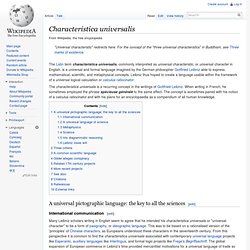
Leibniz thus hoped to create a language usable within the framework of a universal logical calculation or calculus ratiocinator. The characteristica universalis is a recurring concept in the writings of Gottfried Leibniz. When writing in French, he sometimes employed the phrase spécieuse générale to the same effect. Squashed Philosophers Abridged Editions - Berkeley - Principles of Human Knowledge. George BerkeleyPrinciples of Human Knowledge ...
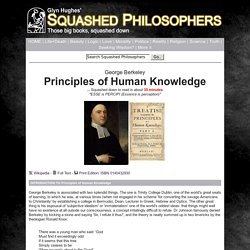
Squashed down to read in about 35 minutes"ESSE is PERCIPI (Essence is perception)" Wikipedia - Full Text - Print Edition: ISBN 0140432930 George Berkeley is associated with two splendid things. What did Einstein know about Knowledge Management? Quite a lot, it appears!
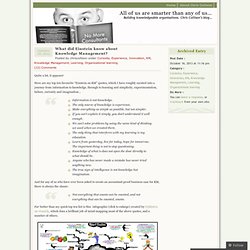
Here are my top ten favourite “Einstein on KM” quotes, which I have roughly curated into a journey from information to knowledge, through to learning and simplicity, experimentation, failure, curiosity and imagination… Information is not knowledge.The only source of knowledge is experience.Make everything as simple as possible, but not simpler.If you can’t explain it simply, you don’t understand it well enough.We can’t solve problems by using the same kind of thinking we used when we created them.The only thing that interferes with my learning is my education.Learn from yesterday, live for today, hope for tomorrow. The important thing is not to stop questioning.Knowledge of what is does not open the door directly to what should be.Anyone who has never made a mistake has never tried anything new.The true sign of intelligence is not knowledge but imagination.
Not everything that counts can be counted, and not everything that can be counted, counts. S Knowledge Management Strategy. Document Summary UNDP’s new strategic knowledge management (KM) framework operationalizes the KM objectives of the Strategic Plan 2014-2017, drawing from lessons from the last Knowledge Strategy 2009-2011 implementation as well as feedback from staff, clients and formal evaluations.
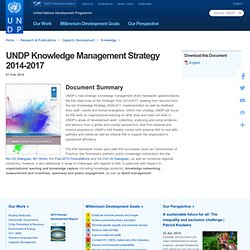
Within this strategy UNDP will focus its KM work on organizational learning on what does and does not work in UNDP’s areas of development work, collecting, analysing and using evidence and lessons from a global and country perspective, and from external and internal experience. UNDP’s KM thereby covers both external KM for and with partners and clients as well as internal KM to support the organization’s operational efficiency. Tree. Looking for Strategies and Activities?
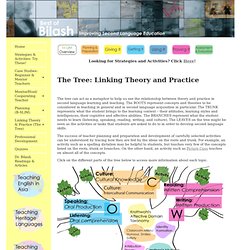
Click Here! The tree can act as a metaphor to help us see the relationship between theory and practice in second language learning and teaching. The ROOTS represent concepts and theories to be considered in teaching in general and in second language acquisition in particular. The TRUNK represents what the student brings to the learning context – their attitudes, learning styles and intelligences, their cognitive and affective abilities. LoSUposter.jpg (Image JPEG, 4334x2618 pixels) Alphabet of human thought.
The alphabet of human thought is a concept originally proposed by Gottfried Leibniz that provides a universal way to represent and analyze ideas and relationships, no matter how complicated, by breaking down their component pieces.
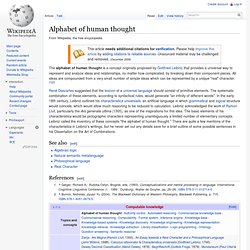
All ideas are compounded from a very small number of simple ideas which can be represented by a unique "real" character.[1][2] René Descartes suggested that the lexicon of a universal language should consist of primitive elements. The systematic combination of these elements, according to syntactical rules, would generate "an infinity of different words".
In the early 18th century, Leibniz outlined his characteristica universalis, an artificial language in which grammatical and logical structure would coincide, which would allow much reasoning to be reduced to calculation. Tentative de définition du réel : M. Serres et E. Klein. Sondes interplanétaires, télescopes spatiaux, accélérateurs de particules géants, éprouvettes et ordinateurs...
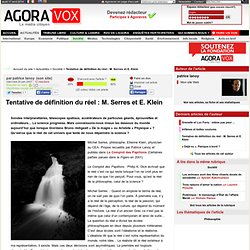
Know-Center. Philosophy of information. The philosophy of information (PI) is the area of research that studies conceptual issues arising at the intersection of computer science, information science, information technology, and philosophy.
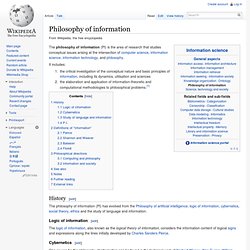
It includes: the critical investigation of the conceptual nature and basic principles of information, including its dynamics, utilisation and sciencesthe elaboration and application of information-theoretic and computational methodologies to philosophical problems.[1] History[edit] IB Diploma Theory of Knowledge course. Knowledge. Knowledge acquisition involves complex cognitive processes: perception, communication, and reasoning; while knowledge is also said to be related to the capacity of acknowledgment in human beings.[2] Theories of knowledge[edit] In contrast to this approach, Wittgenstein observed, following Moore's paradox, that one can say "He believes it, but it isn't so," but not "He knows it, but it isn't so.
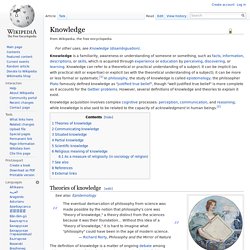
" [5] He goes on to argue that these do not correspond to distinct mental states, but rather to distinct ways of talking about conviction. What is different here is not the mental state of the speaker, but the activity in which they are engaged. For example, on this account, to know that the kettle is boiling is not to be in a particular state of mind, but to perform a particular task with the statement that the kettle is boiling.
Category:Knowledge. Knowledge. What we call knowledge does not and cannot have the purpose of producing representations of an independent reality, but instead has an adaptive function. - Ernst von Glasersfeld, 2001 Knowledge is what is known; the confident understanding of a subject, potentially with the ability to use it for a specific purpose.
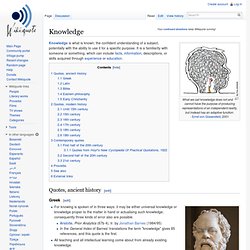
It is a familiarity with someone or something, which can include facts, information, descriptions, or skills acquired through experience or education. Quotes, ancient history[edit] Greek[edit] As for me, all I know is that I know nothing -Socrates (470-399 BC) Latin[edit] Epistemology.
A branch of philosophy concerned with the nature and scope of knowledge Epistemology (; from Greek ἐπιστήμη, epistēmē, meaning 'knowledge', and -logy) is the branch of philosophy concerned with the theory of knowledge. Epistemology is the study of the nature of knowledge, justification, and the rationality of belief. Much debate in epistemology centers on four areas: (1) the philosophical analysis of the nature of knowledge and how it relates to such concepts as truth, belief, and justification,[1][2] (2) various problems of skepticism, (3) the sources and scope of knowledge and justified belief, and (4) the criteria for knowledge and justification.
Epistemology addresses such questions as: "What makes justified beliefs justified? " Category:Concepts in epistemology. Portal:Epistemology. According to Plato, knowledge is a subset of that which is both true and believed Epistemology or theory of knowledge is the branch of philosophy that studies the nature, methods, limitations, and validity of knowledge and belief.
The term "epistemology" is based on the Greek words "επιστήμη or episteme" (knowledge or science) and "λόγος or logos" (account/explanation). Sociology of knowledge. The sociology of knowledge is the study of the relationship between human thought and the social context within which it arises, and of the effects prevailing ideas have on societies.
It is not a specialized area of sociology but instead deals with broad fundamental questions about the extent and limits of social influences on individual's lives and the social-cultural basics of our knowledge about the world.[1] Complementary to the sociology of knowledge is the sociology of ignorance[2] including the study of nescience, ignorance, knowledge gaps or non-knowledge as inherent features of knowledge making.[3] [4] [5] The sociology of knowledge was pioneered primarily by the sociologists Émile Durkheim and Marcel Mauss at the end of the 19th and beginning of the 20th centuries. Their works deal directly with how conceptual thought, language, and logic could be influenced by the sociological milieu out of which they arise. Schools[edit] Émile Durkheim[edit] The Theory of Knowledge. The Theory of Knowledge The Theory of KnowledgeWhat is Scientific Method? Limits of EmpiricismPrejudice Against DialecticsStalinist Caricature "It is the customary fate of new truths to begin as heresies and to end as superstitions.
" (T. H. The basic assumption underlying all science and rational thought in general is that the physical world exists, and that it is possible to understand the laws governing objective reality. "Indeed, it’s hard to imagine how science could exist if they didn’t. Knowledge ecosystem. The idea of a knowledge ecosystem is an approach to knowledge management which claims to foster the dynamic evolution of knowledge interactions between entities to improve decision-making and innovation through improved evolutionary networks of collaboration.[1][2] In contrast to purely directive management efforts that attempt either to manage or direct outcomes, knowledge ecosystems espouse that knowledge strategies should focus more on enabling self-organization in response to changing environments.[3] The suitability between knowledge and problems confronted defines the degree of "fitness" of a knowledge ecosystem.
Articles discussing such ecological approaches typically incorporate elements of complex adaptive systems theory. Known implementation considerations of knowledge ecosystem include the Canadian Government.[4] Key Elements[edit] To understand knowledge ecology as a productive operation, it is helpful to focus on the knowledge ecosystem that lies at its core. 1. 2. The History of Distraction, 4000 BCE to the Present. Knowledge mobilization. The term Knowledge Mobilization (KMb) refers to moving available knowledge (often from formal research) into active use. Knowledge transfer. Collective Knowledge Systems: Where the Social Web meets the Semantic Web. Collective Knowledge Systems: Where the Social Web meets the Semantic Web [*] Tom Gruber TomGruber.org Summary What can happen if we combine the best ideas from the Social Web and Semantic Web? What I Learned in My Knowledge Management Class. The following essay summarizes some key concepts taught by Pierre Lévy in his excellent Knowledge Management seminar.
It may be read as a follow-up to my previous article. USI HSG Knowledge Communication. Histoire comparée et anthropologie des pratiques savantes. KMbeing. Knowledge Is a Common Good - Transform Network. Creating a Knowledge Sharing Culture by David Gurteen. First published in Knowledge Management Magazine, Volume 2, Issue 5, February 1999It is often said that it is essential to create a "Knowledge Sharing Culture" as part of a Knowledge Management initiative.
An isolated knowledge management programme looked after by a privileged few is a paradox in itself and will not survive for long. Understanding Knowledge as a Commons. Knowledge in digital form offers unprecedented access to information through the Internet but at the same time is subject to ever-greater restrictions through intellectual property legislation, overpatenting, licensing, overpricing, and lack of preservation.
Looking at knowledge as a commons—as a shared resource—allows us to understand both its limitless possibilities and what threatens it. Knowledge representation and reasoning. Knowledge representation and reasoning (KR) is the field of artificial intelligence (AI) devoted to representing information about the world in a form that a computer system can utilize to solve complex tasks such as diagnosing a medical condition or having a dialog in a natural language. Knowledge representation incorporates findings from psychology about how humans solve problems and represent knowledge in order to design formalisms that will make complex systems easier to design and build.
A picture is worth a thousand words. What is Psychedelic Information Theory? Category:Knowledge representation. Know. SECI model of knowledge dimensions. ToK.gif (Image GIF, 900x700 pixels) 50 shades of knowledge management. Category:Knowledge management. Commonsense knowledge base. Category:Knowledge engineering. Knowledge base. Classora Knowledge Base. The Tree of Knowledge System. Tree of Knowledge System/Expert article by Gregg Henriques. Tree of Knowledge System.
Knowledge organization. ISKO: International Society for Knowledge Organization. Pyramide de la complexité. Category:Information, knowledge, and uncertainty. Correspondence theory of truth. Information literacy. State of the art. Threshold knowledge. Gc.pdf (Objet application/pdf) What are not threshold concepts. The Threshold Concept.
UNESCO Launches Free Online Course on Media and Information Literacy « Media Rights Agenda. Confirmation holism.